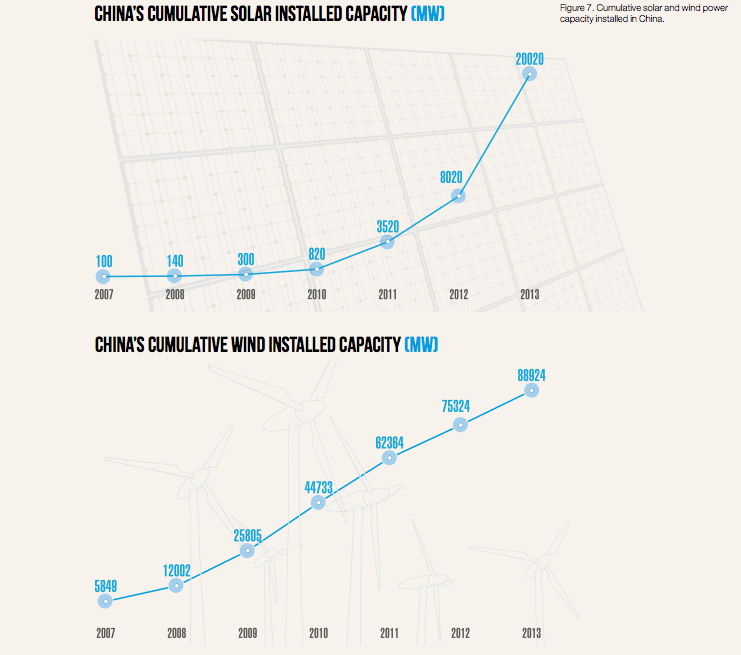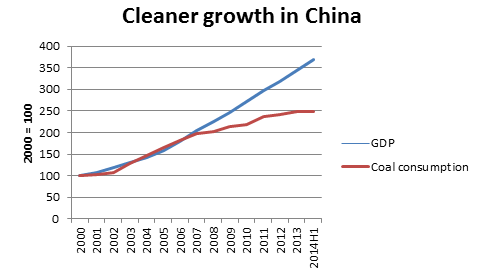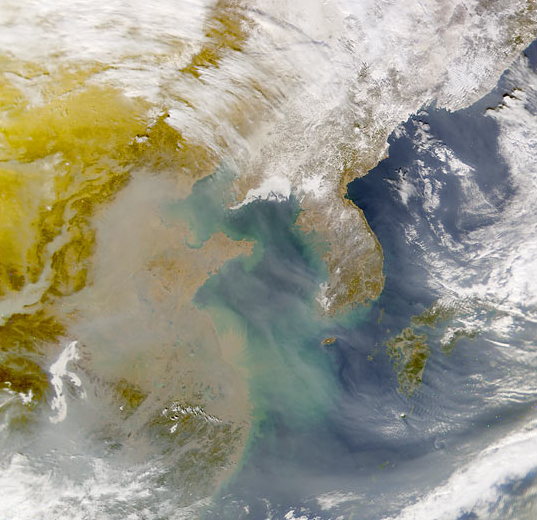7 September 2014
Who Really Declared War on Coal
Posted by Dan Satterfield

China is installing wind and solar power at rate previously unheard of, and they have no choice. The country is choking on pollution from coal. (From Greenpeace report here)
Have you seen those slick adverts about clean coal on cable TV lately? They seem to have disappeared, but I may be just missing them. If you live in the UK, you won’t be seeing them on British TV, because they’ve been banned by regulators there as misleading, and that’s the kind way of putting it. Bald faced lie is IMHO more accurate. (Here in America, you can get away with far more of course. Just an hour of late night TV viewing will assault you with a slew of adverts for everything from enlarged prostate remedies,to diet pills, etc. None of which could pass scientific muster.)
Who Really Declared War On Coal
There’s been a lot of talk over the past year about a war on coal, but those who blame the U.S. administration are missing the real picture. There is indeed a war on coal, but it was declared by Science, and increasingly the government of China. The science is overwhelming that coal is the dirtiest fossil fuel out there, and while CO2 is the biggest long-term issue, there are all the other problems, like a toxic brew of acid rain, mercury, arsenic poisoning, coal sludge, etc. Air pollution is clearly responsible for crop losses as well, and a new paper in Geophysical Research Letters estimates that India is losing enough food to feed over 90 million people because of it. The science is clear, and to claim that coal is anything but the worst possible way to make energy is an indefensible position.
If you’re the CEO of a coal company there has been only one bright spot in your soot covered eyes, and that is China. Most coal companies have looked to China for profitability, but now even that is turning into a nightmare. The government there has announced a ban on the burning of coal around Beijing that will begin in 5 years, and look at the graph courtesy of a report from Greenpeace. GDP and coal consumption seem to have decoupled! Coal consumption is flat lining!
It’s increasingly clear that coal-burning in China has turned the nation into an environmental disaster zone. The cloud of soot that hangs over the region is clearly visible to weather and environmental satellites and is even detectable as far away as California. A paper last year in PNAS estimated that the pollution is reducing life expectancy in China by over 5 years! Yes, it’s that bad.
Big changes are underway however, and the government has declared a war on pollution (and that means a war on coal). In 2013, China installed 12 gigawatts(GW) of solar power, far surpassing the previous one year record of 8 GW. In one year, China installed more solar power than the UK has EVER. It still has over 2,000 coal-fired power plants, but if the growth rate of clean energy continues, China will get cleaner air and spell doom for coal companies.
Is There A Politician Who Has The Courage To Tell The Truth To Coal Country?
In places like West Virginia, Wyoming, and Montana, there seems to be very few politicians who will tell the public what they refuse to believe. They would almost certainly lose their bid for office if they did, and it seems a real catch 22 has developed. The public refuses to believe the truth (although most of them likely realize it’s true), and will give their vote to someone who tells them climate change is a myth and coal can be a responsible energy option. Clean coal is the true myth, but what politician would tell the truth if he knew it would cost him his job!
Places like West Virginia need to be using all of their resources to move to an economy which does not rely on fossil fuels, and that means better education in a more diverse economy. West Virginia has fewer college graduates than any other state, and a Washington Post story last month gives an idea into the mindset of many. The Nation also has a well done piece about coal in West Virginia, and the gist of it to me was If your parents do not value education, it’s very likely, you will grow up likewise.
If you are a student in West Virginia (or in the coal fields of some other place), then have no doubt that coal is dying. It has about as much of a chance of coming back as your evening newspaper carrier. While there is NO SUCH THING as clean coal now, it MIGHT be theoretically possible, (although storing it safely seems to be an almost insurmountable problem). However, the cost to make it clean will make solar and wind energy a grand bargain. You can try to convince China that coal is a viable solution to their energy requirements (good luck on that!), but if you are battling against scientific facts, you will lose. Maybe not right away, and you can always convince a good majority of people to believe a well disguised lie, but in the end you will lose.
King Coal’s attempts to get misinformation into the classroom has (thankfully) been foiled, but that does not mean you should not have sympathy for the residents of coal country. There are thousands of miners who have little education and no skills, and I feel for them. Their way of life is passing into history, but telling them the truth, and planning for a different economy is the only right thing to do. How often I have used the famous quote by Upton Sinclair here, but nothing explains the refusal of the people and politicians to accept the obvious.
“It is difficult to get a man to understand something when his salary depends upon him not understanding it.” Upton Sinclair




 Dan Satterfield has worked as an on air meteorologist for 32 years in Oklahoma, Florida and Alabama. Forecasting weather is Dan's job, but all of Earth Science is his passion. This journal is where Dan writes about things he has too little time for on air. Dan blogs about peer-reviewed Earth science for Junior High level audiences and up.
Dan Satterfield has worked as an on air meteorologist for 32 years in Oklahoma, Florida and Alabama. Forecasting weather is Dan's job, but all of Earth Science is his passion. This journal is where Dan writes about things he has too little time for on air. Dan blogs about peer-reviewed Earth science for Junior High level audiences and up.
Residential and local solar power between 45° N & S latitude will replace fossil fueled power in many places, but windpower kills so many birds and bats we should think very carefully about how much to install. Without insectivores we’ll increase the use of pesticides which can’t be a good thing.
“You can’t do just one thing.”
——-Garrett Hardin – Ecologist
Lot’s of work being done to figure out how to reduce this…esp. with bats. Good link here: https://www.fort.usgs.gov/science-feature/96
Thanks Dan. Great Post!
Thank you for this very informative piece; full of great links to follow.
I’ve always believed the argument that the US (and Canada, where I live) dropped out of Kyoto because it put these highly-developed countries at a disadvantage against still-developing countries like China. Seemed to make since, but that argument doesn’t hold water at all. China remains a Kyoto signatory, and it will have absolutely no problem meeting Kyoto targets; none at all, and it will voluntarily go much farther. Voluntarily.
Thanks, China!
Certainly gains in solar and wind electrical production is a good thing, but to state that China’s demand for coal is changing the coal outlook in the US is a bit of a reach. Check out the EIA’s website for coal — US coal exports to China are a tiny percentage of our overall production (~10 million tons exported per year to China, versus over 1 billion tons produced — 1%). All the recent hype and news about coal export terminals, etc. is because US companies are trying to get INTO that market…they aren’t really there yet. It’s great China is cutting their coal needs, but it’s overall effect to current US coal production (at least at this moment in time) seems to be overstated.
TIL that US coal producers, seeing a drop in demand here in the US, are shipping more coal than ever out of the country. That coal is of course being burned nonetheless in other places, and probably with even fewer pollution controls than we have (such as ours are). This practice has to be stopped, but again, what politician will stand up to do so?
(Note: “TIL” means “today I learned”. Sorry for the Internet jargon. 🙂
I watched BBC World News last night (here in New Brunswick). The journalist who prepared a special report on the UN Climate Summit (being held at UN Headquarters in New York) concluded by saying that China has decided to take a world leadership role in reducing greenhouse emissions.
in a (translated) address to the summit, China’s Vice-Premier Zhang Gaoli said that China wanted to act more rapidly than other developed countries, and would set a target of reducing its emissions of carbon per unit of GDP by 45%, compared with levels in 2005 (which the chart above shows that those emissions were increasing at about 100% the rate of GDP growth).
By contrast, the US says “it’s up to us to lead” but then sets no aggressive goals and makes no commitments. It rings hollow. And I think it was implied by the BBC journalist that China is taking the lead because the US won’t.
The world needs China’s leadership now.
It is a common belief that it will not make a difference if the U.S. makes changes to our carbon output because China is such a large emitter and thus it will have no effect. The evidence for that claim is at best shaky, and the truth of the matter is that they are indeed ahead of us in their thinking.